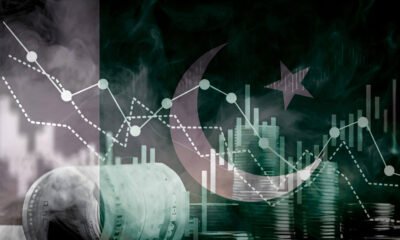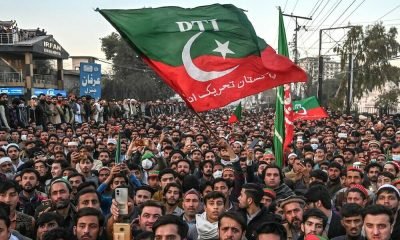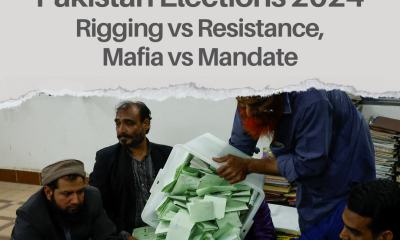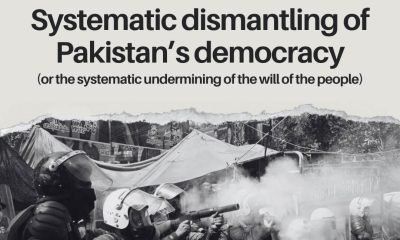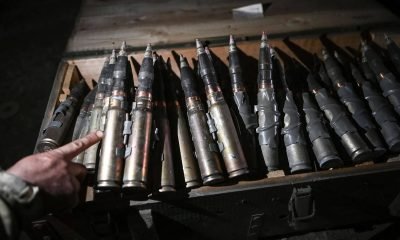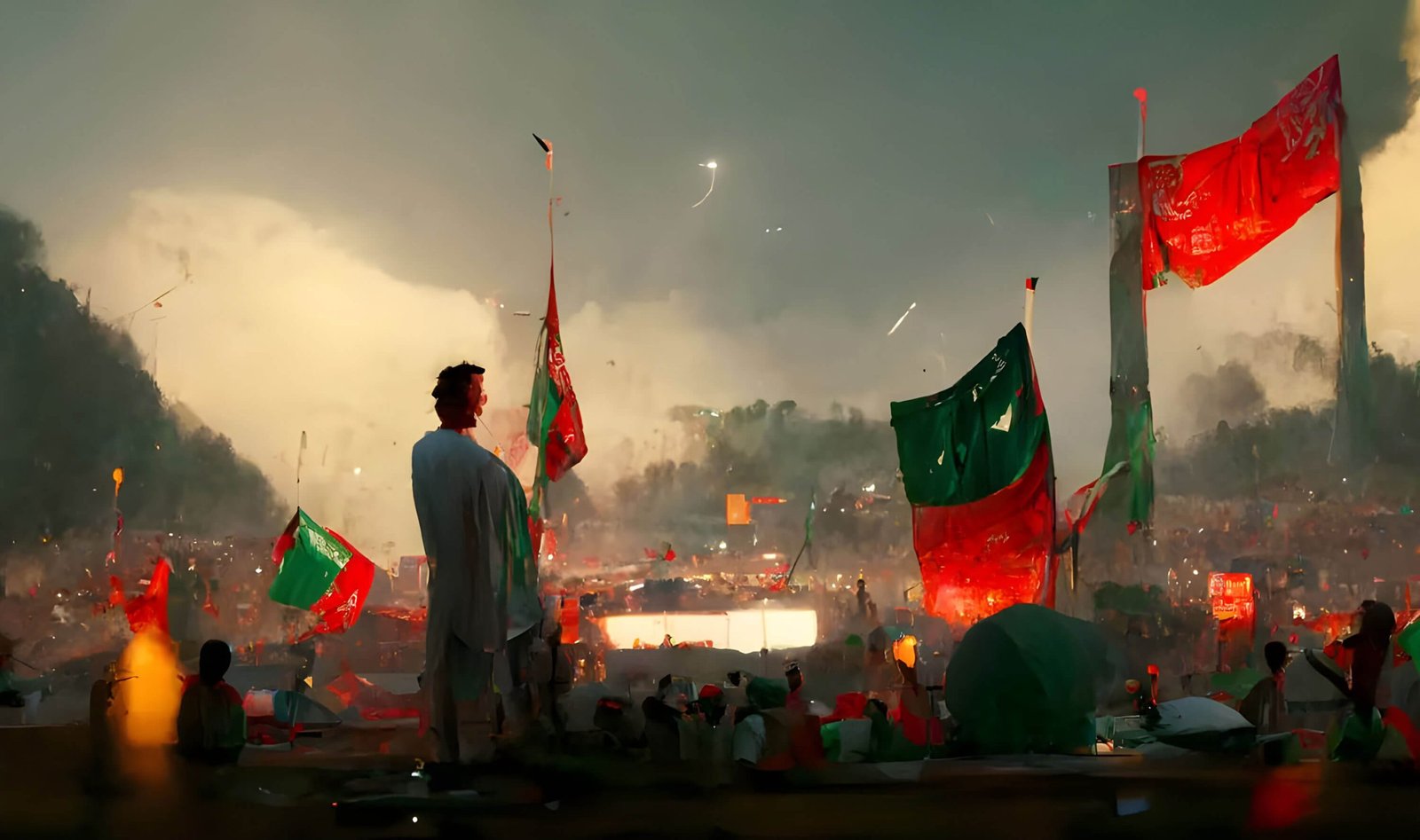

Pakistan
Imran Khan vs the Status Quo: Pakistan’s Quest for Haqiqi Azadi
Pakistan’s political landscape has been marred with significant challenges. Corruption, poor governance, and an absence of the rule of law are the hallmark of Pakistani politics. Amidst this, one figure emerged with a vision for change – Imran Khan
When we look at political movements and revolutions, it is important to understand the context in which they emerged. The context is fundamental to developing a comprehensive understanding of that movement, and to make predictions as to where it will lead.
It is in this context that we are going to explore Pakistan, which currently stands at the crossroads. Whether the “revolution” will reach its end or not remains to be seen. But the social, political, economic, and intellectual context in which this movement has come about and has panned out is perhaps unprecedented in Pakistan’s history.
Pakistan’s Political Landscape
Pakistan’s political landscape has been tumultuous and marred with significant challenges for decades. Rampant corruption, poor governance, and an absence of the rule of law are the hallmark of Pakistani politics. Corruption has become an ingrained feature of the political system, wherein politicians exploit their positions to enrich themselves and their families. Consequently, there is significant distrust towards political institutions, and many perceive politicians as inherently self-serving and corrupt. The governance systems in Pakistan have remained ineffective, deliberately designed to maintain the status quo. This has caused widespread dissatisfaction with the state and a sense of alienation among large segments of the population. Furthermore, the systematic weaknesses in Pakistan’s judicial system have created an environment of impunity, where those in power cannot be held accountable for their actions. This has allowed the ruling elite to plunder state resources & commit crimes without fear of consequences.
Additionally, Pakistani politics has been dominated by a few families, who have indeed treated the system as a family fiefdom & business. These “businesses” are dynastic, with the power being held by the same families for generations. For instance, the Bhutto family has been dominant in Pakistani politics for decades. Their party, Pakistan People’s Party (PPP) was founded by Zulfiqar Ali Bhutto, who initially served as the foreign minister under the dictator General Ayub Khan. After Bhutto, PPP was inherited by his daughter, Benazir Bhutto, who served two terms as the Prime Minister before her assassination in 2007. After her death, her husband, Asif Ali Zardari, and her son, Bilawal Zardari, took over the party. Zardari later became the President of Pakistan and her son, Bilawal Bhutto Zardari, is now the chairman of the PPP. Similarly, the Sharif family has also held significant political power in Pakistan, with former Prime Minister Nawaz Sharif and his brother, Shehbaz Sharif, leading the Pakistan Muslim League (N). They’ve been succeeded by Maryam Nawaz, daughter of Nawaz Sharif, and Hamza Shahbaz, son of Shehbaz Sharif.
Also, the country has been plagued with terrorism as a result of the misplaced policies of successive governments. After Pakistan joined the US war on terror, it effectively became a client state for the US. This relationship with the US was a double-edged sword for Pakistan. On the one hand, Pakistan faced retaliation from the Taliban for being an abettor to the US occupation forces, and on the other hand, Pakistan was termed as “double-faced” by its ally, the US, which carried out hundreds of drone strikes into Pakistan. Drone strikes by their very nature have collateral, all of which exacerbated the matters for Pakistan.
Another dominant factor shaping Pakistan’s political landscape is the role of the military. The military (called the establishment) has played an overarching role in Pakistani politics, often acting as a powerful kingmaker and shaping political outcomes. The military has directly ruled the country for almost three decades, but even under the civilian governments, it has maintained a strong influence over key policy decisions, as well as the decision-makers!
Therefore, Pakistan remains a country with some of the worst socio-economic indicators. By 2018; the literacy rate stood at 57%, GDP per capita $1,621, poverty rate at 68% (assuming the poverty line at $5) with 40% of children under 5 facing stunting. At the same time, the justice system of Pakistan has also performed dismally; Pakistan ranked 117 in the corruption perception index and 129 out of 140 countries in the rule of law index.
A Ray of Hope
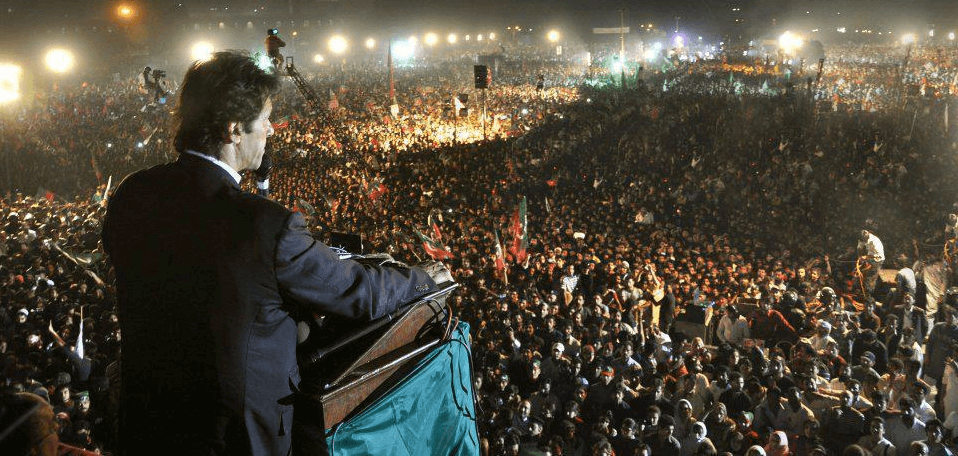
Amidst this, one figure emerged with a vision for change – Imran Khan, the former cricket captain, the World Cup winner and the national hero. After retiring from cricket, Khan became a philanthropist and established Pakistan’s first cancer hospital – Shaukat Khanum Memorial Cancer Hospital, which provides free-of-cost cancer treatment. At this point, attempts were made by the PPP & the PMLN to encourage Imran Khan into joining them. However, Khan understood fully well the flaws that abounded the political system of Pakistan. Ratifying the existing order would be a considerable challenge on its own and knowing that Sharifs (and Bhuttos) were corrupt to the bone, he would have smothered his credibility by joining forces with them. Therefore, he decided to tread his own path, and thus, in April of 1996, Imran Khan officially entered the realm of politics and founded the Pakistan Tehreek-e-Insaf (PTI). Thereby, he embarked on a long arduous journey, with the mission to eradicate corruption, fight injustice, and dismantle the political status quo of Pakistan.
As expected, Khan faced resistance early on, as he struggled to find ground in a two-party system. After being humbled in his first election, Khan was mocked and was suggested to quit politics, which was “a dirty game.” Undeterred by any remarks, Khan continued his political journey. His relentless struggle and sheer determination finally seemed to have materialized on an evening in Oct 2011 during a jalsa at Minar-e-Pakistan, when Imran Khan’s tsunami of 100,000 swept Lahore and marked the beginning of a ‘Naya Pakistan.’ The Minar-e-Pakistan jalsa effectively put Khan on the political landscape, and his message of justice, accountability, and anti-corruption struck a chord with the people of Pakistan.
From then on, PTI became a force to be reckoned with. In the 2013 general elections, PTI emerged as the second-largest party and formed a provincial government in the province of Khyber Pakhtunkhwa (KP). The PTI’s government of KP brought in numerous reforms, particularly in the areas of social sector, governance and administration. This cemented Imran Khan’s position in KP, which became the stronghold for PTI.
Meanwhile, Khan directed his efforts to strengthen his party’s position nationwide, as he rallied against corruption that continued to plague the country. Finally, in the 2018 general elections, the culmination of Khan’s unwavering determination arrived (or it seemed). PTI emerged as the single largest party, and formed the national government in the center while forming provincial governments in Punjab & Khyber Pakhtunkhwa. And finally, Imran Khan was elected as the 22nd Prime Minister of Pakistan.
Imran Khan’s ascend to the seat of the PM brought with it challenges of great magnitude. Khan inherited a government where every institution was marred by corruption and ill practices, the economy was in tatters and the country was near default. These were significantly worsened as Khan faced a hostile neighbour in India, had a razor-thin majority in the parliament and the world was hit by a once-in-a-century pandemic, the Covid-19 pandemic.
Despite the nature and magnitude of challenges, Khan managed to first stabilize and then revive the economy; in the 4 years under Imran Khan, exports grew 31%, remittances grew 57%, IT sector exports increased 145%, large-scale manufacturing reached their highest-ever index, and Pakistani economy generated 5.5 million new jobs, despite covid. Additionally, Imran Khan prioritized the social sector and adopted pro-poor policies; he introduced Pakistan’s largest-ever social protection programme, Ehsaas launched universal health coverage which provided health cover of up to PKR 1 million per family per year under the Sehat Card, launched the Single National Curriculum (SNC) to provide equality of opportunity to children across social statuses. Moreover, for the first time in Pakistan’s history, emphasis was placed on the environment and so, Imran Khan launched the 10-Billion Tree Tsunami project to counter the effects of climate change. Perhaps the most important element of Imran Khan’s term, which was pivotal in shaping the events that were to unfold, was his unwavering and unflinching position on Pakistan’s sovereignty and its foreign policy. For a nation of 220 million people that have been poorly represented and effectively unheard on the international front for decades, Khan’s efforts touched their hearts. Three occasions were particularly defining:
- Imran Khan spoke emphatically against Islamophobia and for the Kashmir cause at the 74th United Nations General Assembly Session in September 2019
- Imran Khan responded with “absolutely not” when asked if Pakistan would allow the US to set up military basis to conduct cross-border counter-terrorism operations in Afghanistan.
- Khan refused to take a side in the Russian-Ukraine conflict, despite being pressurized by the US to condemn the Russian aggression, His remarks “kiya hum aap kay ghulaam hain, keh jo aap kahein hum kar lein” (are we your slaves, that we oblige to whatever you say) at a jalsa were lauded across the country. Khan then proceeded to negotiate a deal with Russia for discounted oil, stating unequivocally that his priority will always be his own people.
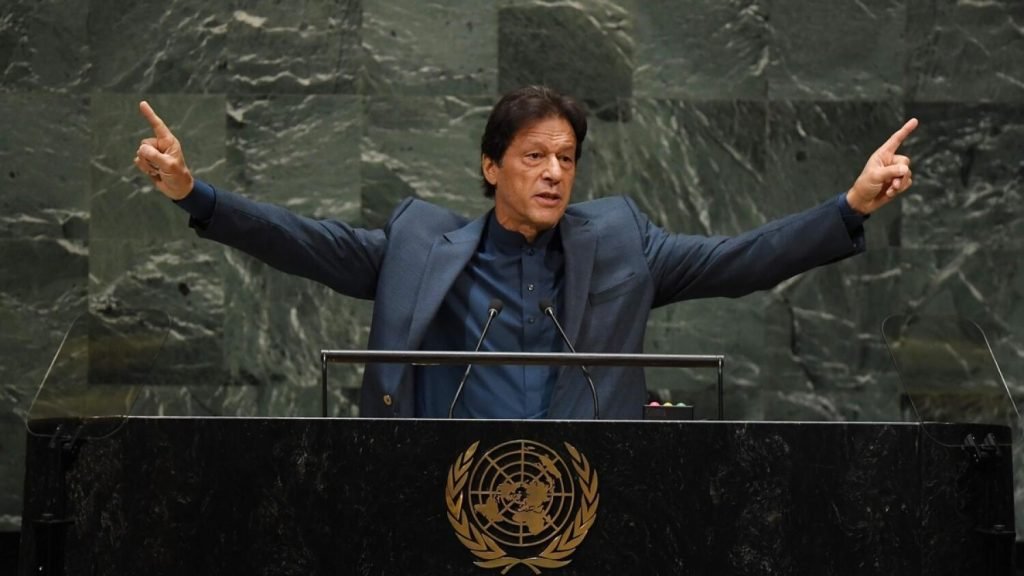
It was against this backdrop that a no-confidence motion was officially tabled against Imran Khan by a 13-party alliance, Pakistan’s Democratic Movement (PDM), backed by the Pakistani establishment (as now well acknowledged by the former Chief of Army Staff, Qamar Javed Bajwa) after Pakistan received a threatening cypher from the US. These events ousted Imran Khan from the government in April 2022, but they set in motion a movement that has perhaps altered Pakistan’s political power structure permanently.
The PDM and its Rule
This saga truly began with Nawaz Sharif who feigned illness and absconded to London. His brother, Shehbaz Sharif, had no qualms in providing legal guarantees which he had no intention of honouring. Today, he is the Prime Minister of Pakistan, with this fact conveniently forgotten that he needs to be behind bars for giving Court a false testimony. Besides, this family has been found wanting when it comes to morality, decency, truth and honour, and has always brushed these away as unnecessary nuisances. Benefitting from “foreign interventions” and administrative intrigues that were set in motion, by the powers described earlier, the 13-party alliance banded together to protect themselves from the imminent legal action against the many crimes that they had committed.
Once in power, these people proceeded to misuse their office, foremost by amending the accountability laws. This allowed them to quash all criminal cases against themselves and secure legal protection for their crimes in the past, the present and potentially in the future. Soon after, they caused, with blatant disregard for the nation and the State, a complete collapse of governance and imposed a reign of terror. This government has the singular distinction of failing in every single field of governance and administration, which includes foreign policy, the economy, the law and order as well as the justice system. They shamelessly try to compare their period of incompetence with the last government, which posted a 6% GDP growth rate, high economic activity, highest-ever exports, highest-ever remittances, highest-ever tax collection, highest-ever increase in employment, with remarkable social protection & pro-poor initiatives, like Ehsaas & Sehat Card, despite facing once in a century crisis i.e., Covid-19. Under PDM, the GDP growth is predicted to be negative, inflation has soared to unprecedented levels, the rupee is in a free fall against the US dollar, there is large-scale closure of businesses, the manufacturing sector has massively shrunk, exports and remittances have significantly decreased, unemployment looms large, and the country is on the brink of default, with no bailout in sight. Yet they never tire of bleating that they inherited all these ills, which in truth they themselves caused. To cover up for their sheer incompetence, the government has effectively silenced the press, ruthlessly censored the media, will-fully disrupted the internet, arbitrarily detained journalists, threatened, harassed and abducted social media activists, and completely disregarded human rights and dignity.
Having arrested all the leaders of the opposition, declaring anyone who opposes them as a terrorist and a criminal, the government has refused to recognise the people’s mandate by denying them the ballot box. The government and its functionaries have displayed a complete disregard for the Constitutional obligation of holding elections. As of now, there is an illegal caretaker setup in the province of Punjab & KP, with the national assembly essentially without any opposition. Resorting to intimidation, blackmail and coercion, they have bullied every State institution into submission and are actively pursuing a campaign to malign the judiciary and force it in line with their skewed practices.
Imran Khan and the Haqiqi Azadi
The ouster of Imran Khan saw something quite exceptional. Historically in Pakistan, changes in the government have been welcomed by the people. Successive governments have been dismissed for scandals including corruption, abuse of power, and deteriorated law & order, each occasion celebrated by citizens. Therefore, the PDM predicted a similar response as it orchestrated the regime change operation. They couldn’t have been more wrong! The regime change was met by an outpouring response from the public, and the day Imran Khan was ousted, millions hit the streets across the country from Khyber to Karachi to protest the attack on their mandate and to send a message that they refuse to accept the PDM government, which they termed as the “imported government,” imposed at the behest of the US & the Pakistani establishment. This sent a wave of shock to those in power, a shock from which they haven’t recovered since.
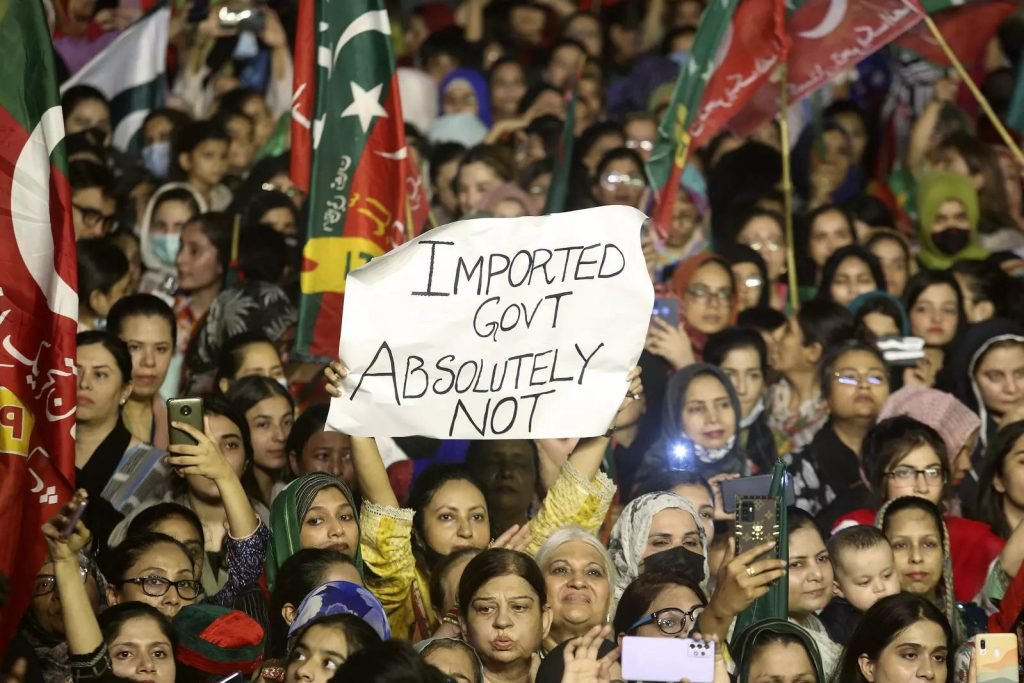
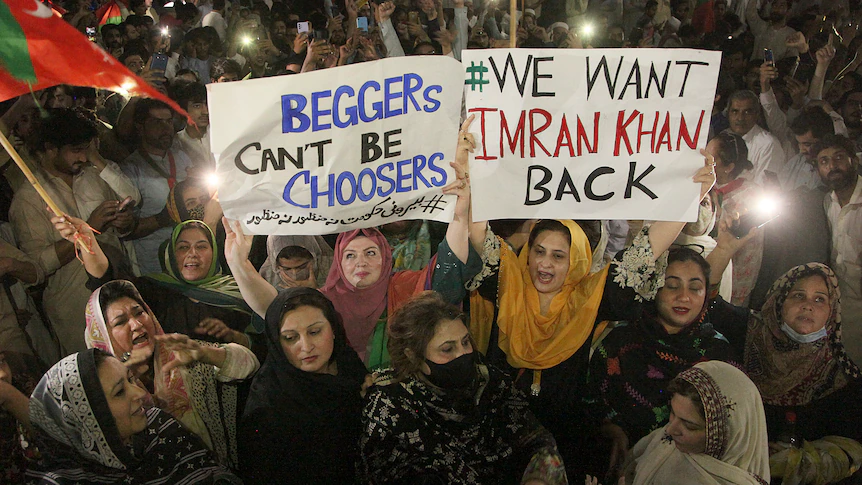


At the same time, Imran Khan started a series of peaceful protests and rallies across the country, with millions rallying behind him. The street power and the popularity demonstrated by Imran Khan were unimaginable, and they immediately put the government on the back foot.


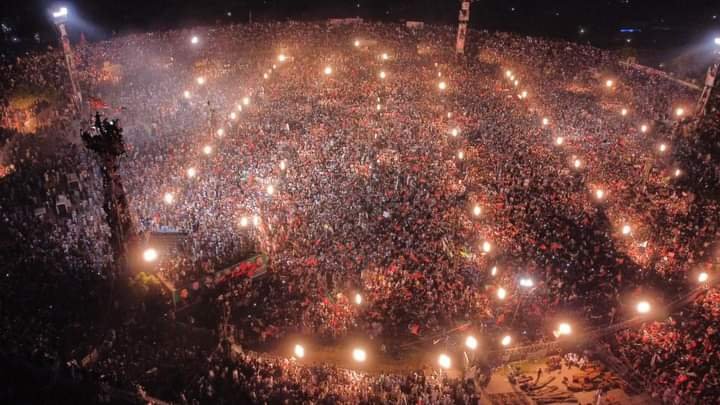
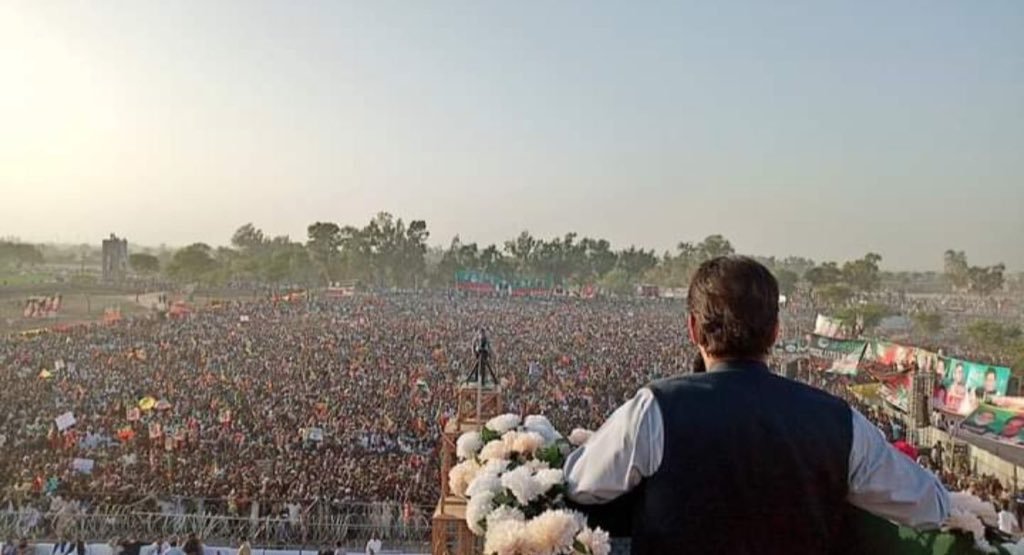
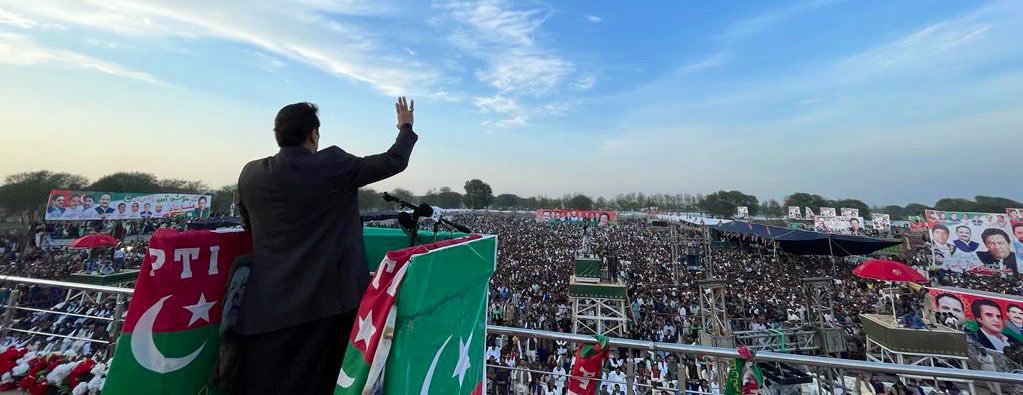

To counter Imran Khan, the government used the age-old tactic of controlling the media. Foremost, they off-aired Imran Khan or any channel that broadcasts his speeches and then bribed specific news media channels to control the flow of information. Unfortunately (or fortunately), the old playbooks were no longer effective. As the government imposed restrictions on the mainstream media, the social media emerged as a powerful tool for disseminating the PTI’s narrative and shaping public opinion. As a result, social media usage across Pakistan increased drastically. The uptake of social media broke the monopoly of a small influential elite over political discourse. Those in power could longer control what can be hidden, what could be presented, or how it could be presented to the public. Everyone with a smartphone has a voice, as well as a platform to raise that voice. The truth could no longer be hidden, and as a result people, especially the youth, were “well-informed.”
Today, the levels of economic & socio-political awareness among the public are at an all-time high. Important topics like the economy, the stock market, the exchange rate, export & import-led growth, corruption, the rule of law, the Constitution, etc., are part of mainstream discourse, even among ordinary citizens such as gardeners, rickshaw drivers, and labourers. These topics have never previously been the discussion points among the public, who have remained caught up with their day-to-day challenges, such as inflation or the cost of living, and rarely anything beyond.
In May 2022, Khan announced a march to the Capital, in an attempt to force the government into early elections. However, the march was met with a brutal response from the State that employed fascist tactics to deal with the protestors. Nevertheless, thousands marched from across the country towards Islamabad, and thousands turned up locally in Islamabad. A pandemonium ensued as the police and rangers used excessive force, tear gas, and batons on peaceful protestors, including women and children, resulting in tragic casualties and injuries. Consequently, Imran Khan decided to call off his rally as he could foresee a clash between the people & the state, which would have turned into a bloodbath.
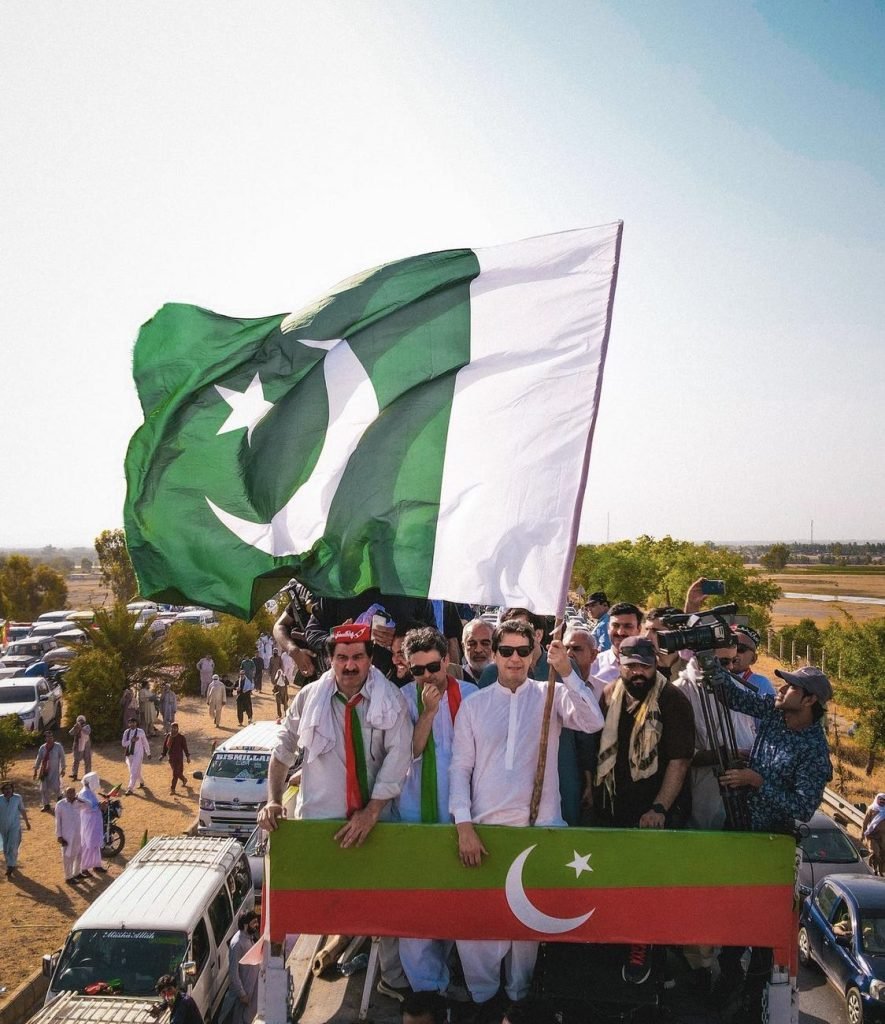
As Khan called off the march, the drawing room analysts of the country who throughout their lives have toed the line of the powerful and are now desperately hoping to maintain the status quo, termed the march as a “failure.” In truth, it was quite the contrary. Sure, the march didn’t result in the resignation of the government, but political movements rarely yield immediate results. The Azadi march did much more than what appears on the surface. It mobilized thousands of workers across the country who, including women, children & elderly citizens, faced and resisted State torture & brutality. It prepared them for the many more challenges that were to come in their quest for Haqiqi Azadi. The first result of this struggle and “political grooming” was observed in the bye-elections on 17 July 2022. Despite the use of state machinery & pre-poll rigging by the government, voters turned out in huge numbers to exercise their fundamental right & protect their votes from being stolen. As a result, the 13-party alliance was swept away in the elections, where PTI won 15 out of the 20 seats of the provincial assembly.
In October 2022, Imran Khan led a long march to Islamabad. The Haqiqi Azadi march, which started from Lahore, was to pass through every city between Lahore and Islamabad via the GT road. Once again, Imran Khan was joined by thousands of supporters at each point of the march, which showed the level of political awareness and mobilization within the country, and also showed precisely why the government was running away from the elections. A notable element of such rallies was that people across ages, genders, and socio-economic status, have been a part of this movement; the rich and the poor; the young and the elderly; men and women, and so on.
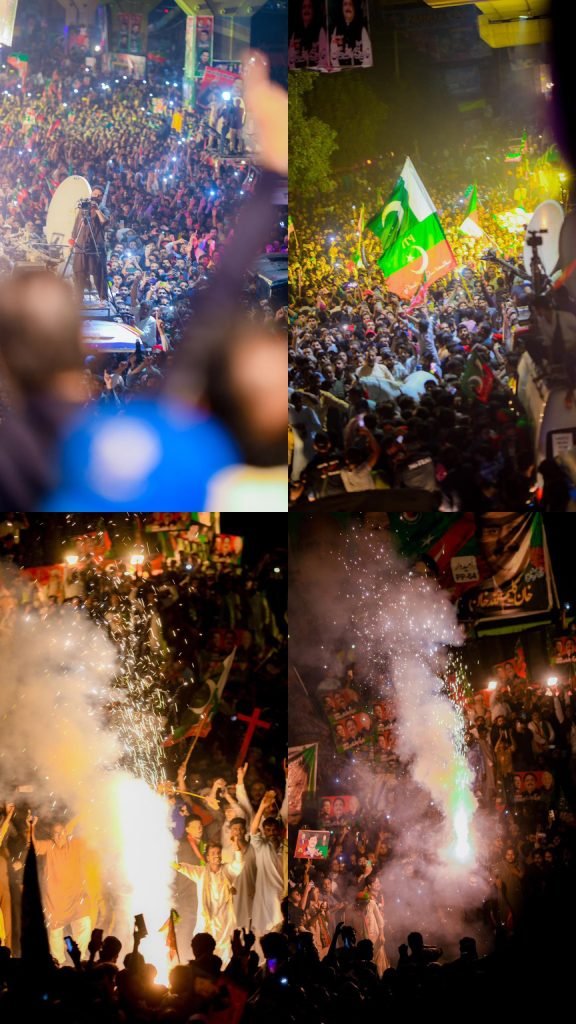
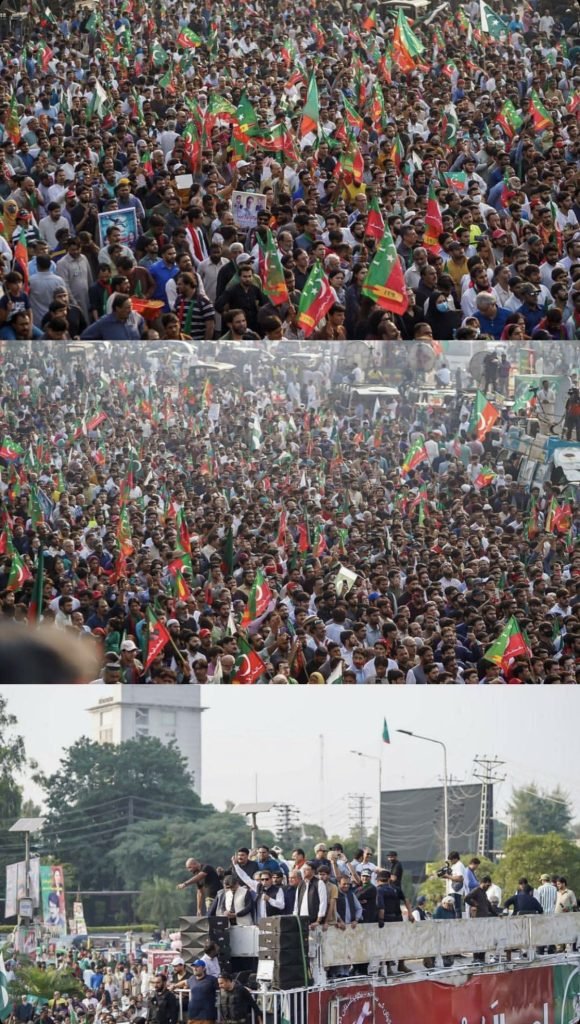
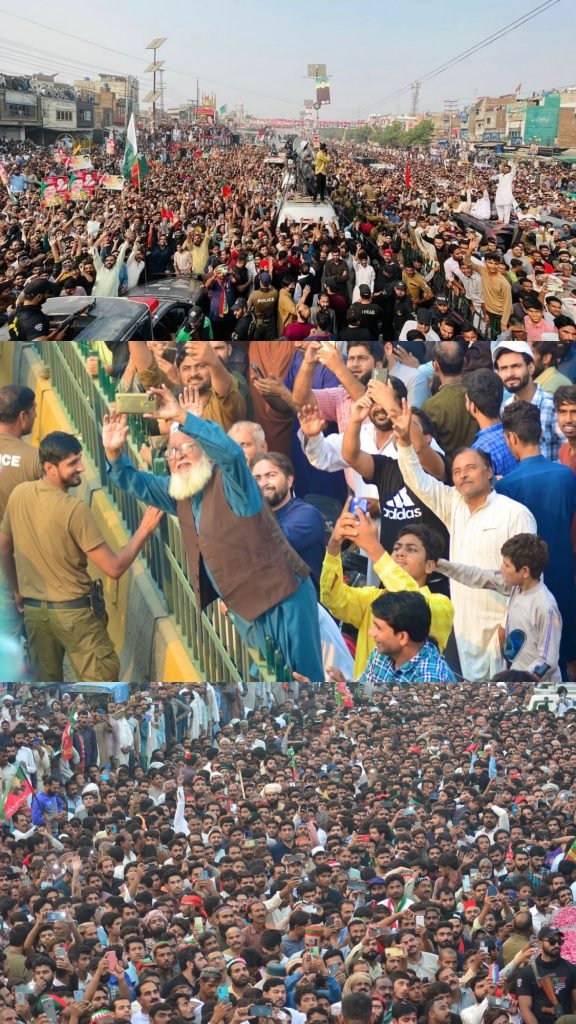
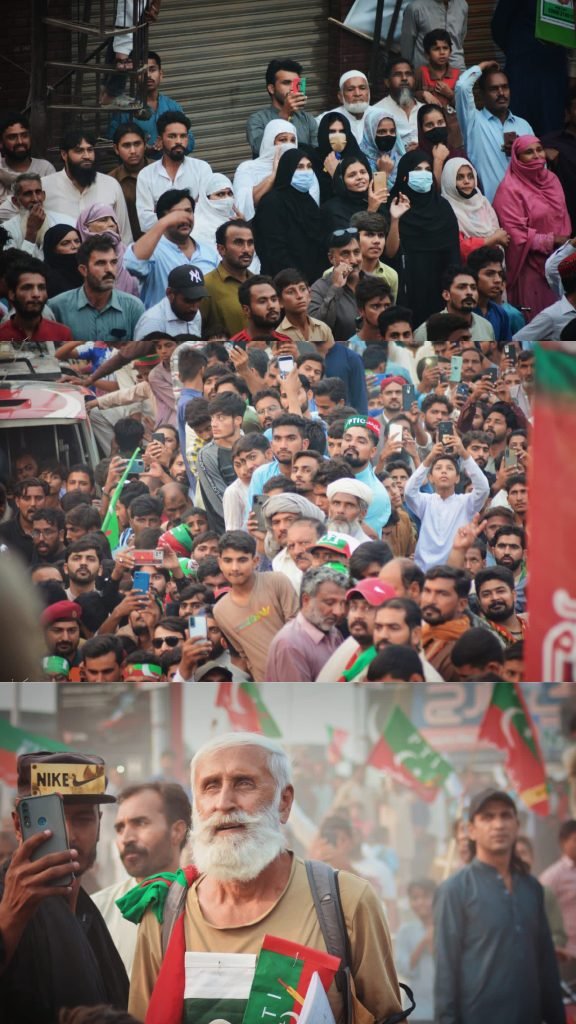
On Nov 3, as his long march was passing through Wazirabad, Imran Khan faced an assassination attempt. Khan had highlighted the threat to his life on several occasions as well as the methods of conducting such an act, the assassination attempt followed the exact same script. The Joint Investigation Team (JIT) findings revealed that the attack was preplanned and orchestrated by powerful individuals, involving three shooters. Despite the attack on Imran Khan, the long march moved towards Islamabad, though this time without Khan.
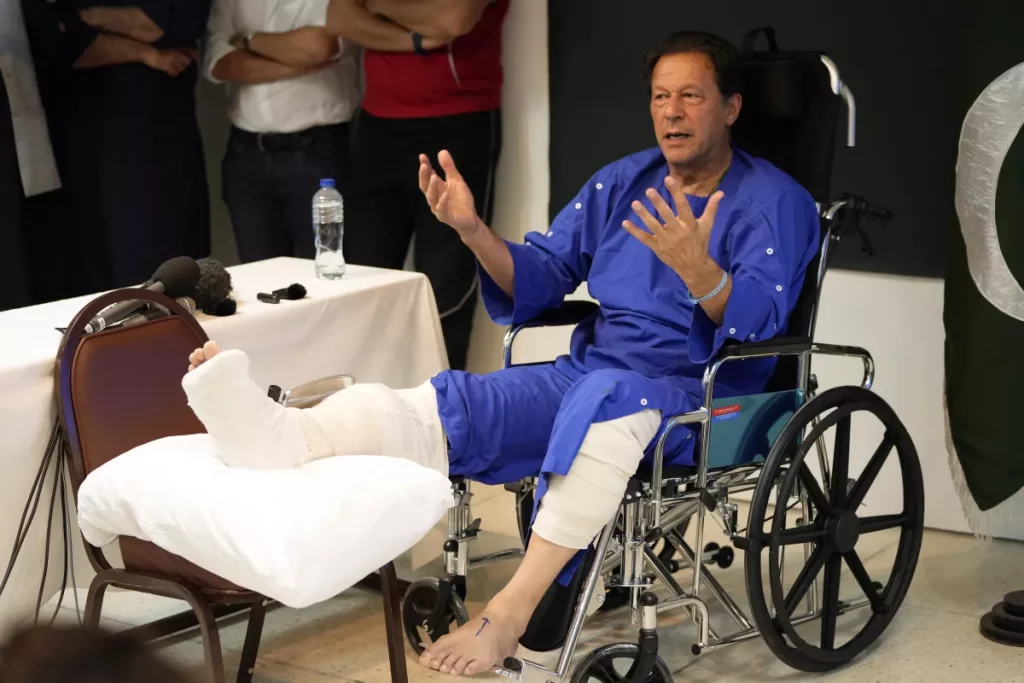

On Nov 29, as the march approached Rawalpindi, Khan gave a call for a gathering where he would join and speak to his supporters. Despite the threats to life and the warnings communicated by the government, thousands of protestors reached the protest to welcome Khan. On the occasion, Khan announced the dissolution of the provincial assemblies of KP and Punjab.
Meanwhile, the State continued to clamp down on Imran Khan and his supporters in every possible. In the last 8 months, Imran Khan has been charged under 145 sham cases of blasphemy, sedition, contempt, terrorism, mutiny, murder, etc. The State has since then used these sham cases to threaten, attack & eventually abduct Imran Khan. However, all this managed to do was mobilize more workers for Khan.
First, Imran Khan’s residence at Zaman Park was attacked with full force, as if the police and rangers had come to seize a fort. However, Khan’s supporters and workers intervened and defended him from being illegally abducted. The operation lasted 30 hours and the State used excessive tear gas shells, rubber bullets and batons, but were resisted by people, and the forces had to return with nothing but embarrassment.
Two days later as Khan appeared in the judicial complex in Islamabad, his convoy was attacked yet again, and the judicial complex was taken over by unknown men, who it appears were men from agencies. This was orchestrated in another attempt to assassinate Khan, but once again, the citizens intervened, and Khan escaped this brazen assassination attempt miraculously.
On 9th May 2023, the former Prime Minister of Pakistan, Imran Khan, was dramatically snatched by scores of paramilitary forces from the Islamabad High Court, where both he and his lawyers were attacked with batons. This happened only minutes after Khan got bail in 9 cases of terrorism from the ATC and was set to appear before the IHC for bail in several other cases. The abduction of Imran Khan was seen as outrageous by the people of Pakistan, who came out in numbers to protest. As people protested outside military posts, the rangers opened fire at the protestors, killing over 50 people, with hundreds injured and thousands still detained. Using protests outside military buildings as the pretext, the regime launched a grand operation against PTI workers and leaders, as well as the citizens who are only demanding their fundamental right to vote. Currently, the entire senior leadership of PTI is arbitrarily detained under the colonial laws of Maintenance of Public Order. Over 10,000 workers and supporters of PTI have been detained and kept illegally in custody, where they are threatened and tortured. Citizens are being detained for merely holding placards. A reign of terror has been imposed in an attempt to stifle the spirits of the protestors and kill the movement of Haqiqi Azadi.
Despite the large-scale crackdowns, the detention of leading voices of PTI, and the arrests of tens of thousands of workers and supporters, PTI still dominates the social media discourse. Despite the reign of terror, people are still hitting the streets to demand their fundamental and Constitutional rights. The events of the last 13 months have united the whole country behind a singular cause: to root out this system from its core; to overhaul it completely and start afresh.
No individual, no party, nor any institution has united Pakistan quite like Imran Khan has done; across geographies, across regions, across across ages, demographics and social status, across ethnicities and across religions – never have we witnessed such cohesion among Pakistanis.
How things pan out is yet to be seen. What happens tomorrow we’re yet to find. But there’s one truth that cannot be ignored, one fact that cannot be overlooked, and that is that no force can win a war against its own people. Or as Imran Khan says, “No force can defeat an idea whose time has come.”



